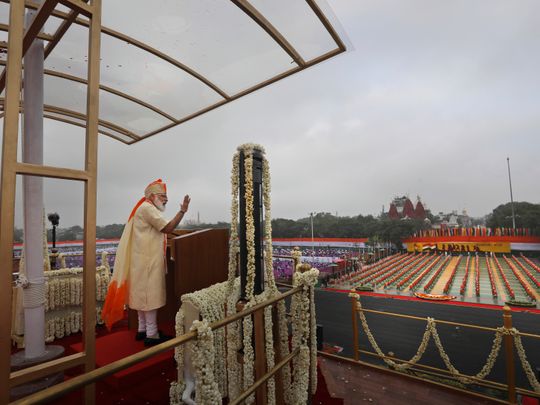
India’s Prime Minister Narendra Modi made a powerful pitch on Saturday 26th September at the 75th session of the United Nations General Assembly (UNGA). In his 22-minute pre-recorded speech in Hindi, he said, “People in India are awaiting the process of reforms in the UN. How much longer should India be deprived its role in the decision-making structure?”
India has already served on the Security Council for eight terms totalling sixteen years. Its latest term will commence next year. Modi would like nothing better than for that non-permanent term to be converted to a permanent one. A permanent seat has been India’s long-standing demand. India, it is believed, passed up a chance as early as 1950, when then Prime Minister Jawaharlal Nehru, in the interests of Asian unity, yielded to its larger neighbour, China. More recently, despite crucial support from other permanent members, India’s bid has been repeatedly blocked by China. As long as China enjoys the veto power, this deadlock is unlikely to be resolved. Keeping that aside, Modi argued that India is a responsible power that works for peace and abides by the rule of law.
Moreover, with its 130 billion plus people, it constitutes one-sixth of the world’s population. Offering his mantra of “Reform-Perform-Transform,” he said India had made rapid strides in improving the lot of its own people. In addition, India also tried to help other developing nations whenever and however it could. Modi stressed that India’s ancient and deep-rooted civilizational values encapsulated by the idea of vasudhaiva kutumbakam meant that India considers the whole world as a family and humanity as one entity. India is committed to work for the goodwill and prosperity of all nations, not just for its own selfish progress or power.
He mentioned India’s contribution to peacekeeping, reminding the world that India sent its troops to over 50 peacekeeping missions all across the globe. India has also suffered the maximum casualties among nations for this noble cause. Highlighting India’s leadership in the world’s solar alliance, fight against terrorism, drug trafficking and money laundering, he also promised India’s enhanced commitment, as the world’s largest vaccine producer, to help the world fight the Covid19 pandemic. Modi’s consistent and heroic efforts to improve India’s standing in the world must be applauded. But given the rapidly changing global and security order, the moot question is whether the UN itself remains as important as before. In the past superpowers like the United States have acted unilaterally, just barely staying within the bounds of international law, if not violating it with impunity every now and then.
Today it would seem UN has been powerless to check China’s excesses and abuses. The Uighur Muslims in China have suffered untold indignities and human rights violations. Millions of them are in re-education centres akin to concentration camps, subjected to state indoctrination to wean them away from Islam and make them good communists. Thousands of their mosques have been destroyed and they have been prevented or restricted from practicing their religion. Similarly, draconian measures, in violation of China’s guarantee of freedom and rule of law, have been imposed on Hong Kong. Long before, the takeover of Tibet and its demographic as well as cultural re-organization is tantamount almost to the genocide of a civilisation. In the new fractious and dangerous global environment, the UN seems a weak, compromised, and dated institution, more a talking shop, than forum of meaningful action.
During the global pandemic that afflicts the world, the world health organization (WHO) has itself come under fire for shielding China and misleading us as to the origin, date and virulence of the virus. In such a situation what good would it do for India to gain a seat at the high table of the Security Council? Modi’s answer to such criticism or questioning would be that there is no alternative yet to the UN, howsoever flawed or weakened global body might be. Given this truism India will pay a very important role in counterbalancing China’s hegemonic designs. India, besides being another populous and Asian nuclear power, also aspires to be a global leader on humanitarian and moral grounds, thus correcting the original imperial and Western orientation of the UN.
Read more from Makarand Paranjape
- Attacks on Kangana Ranaut, Madan Sharma: Has Mumbai descended into goonda raj?
- Bloomsbury ban of 'Delhi Riots 2020': Colonial stranglehold on Indian publishing continues
- IPL 2020 in UAE: Cricket in a bio bubble, but the game and lure are not sanitised
- If the UAE and Israel can achieve peace, why not India and Pakistan?
For India and Modi, a permanent seat in the Security Council would be a significant achievement underscoring the rising importance of India as a global player with a difference. Knowing all this, Modi has played his cards right in trying to garner more support for India’s bid. Clearly, it would be a win-win situation for the UN and for India, as it would for Narendra Modi himself as a notable figure on the world stage.








